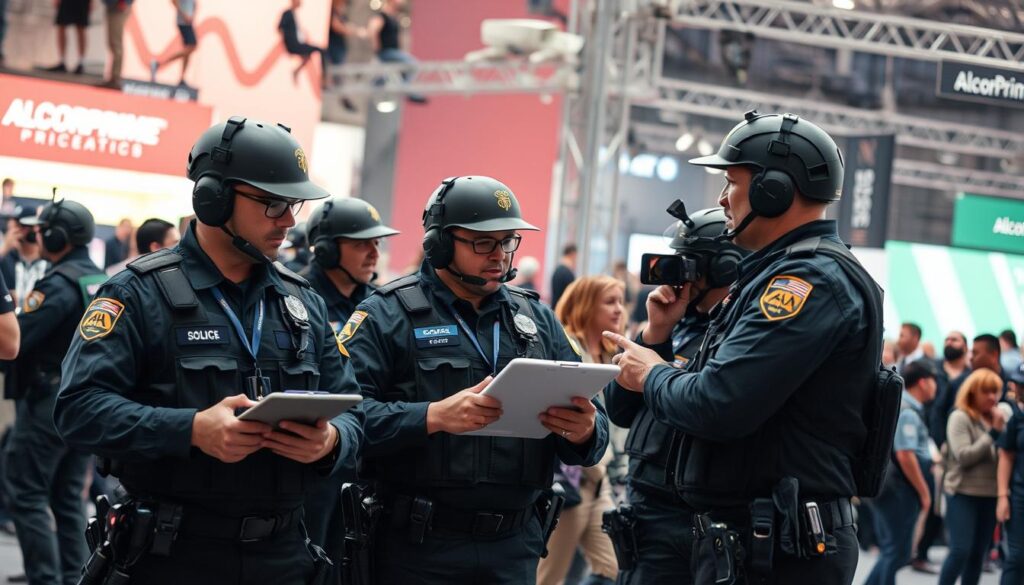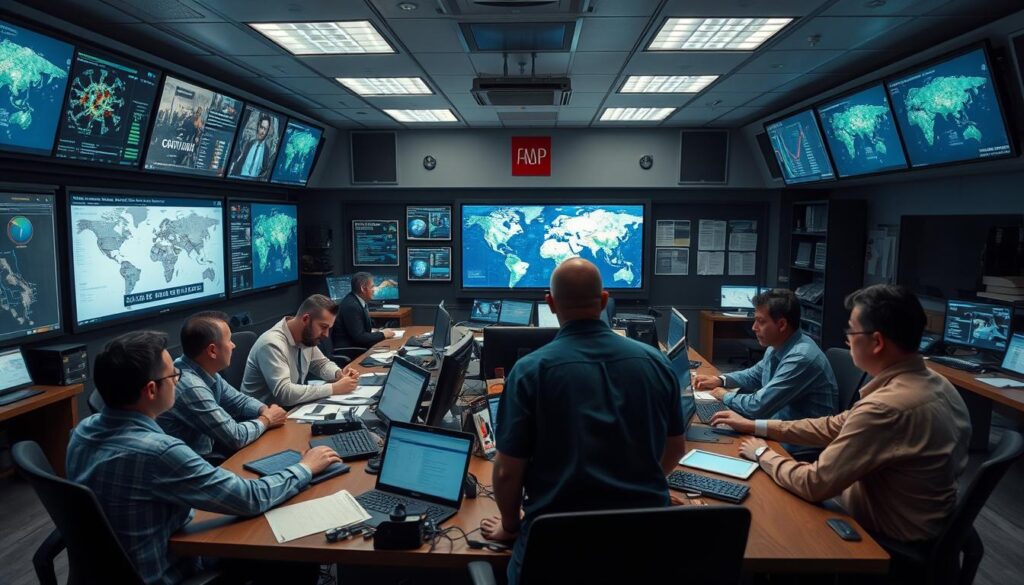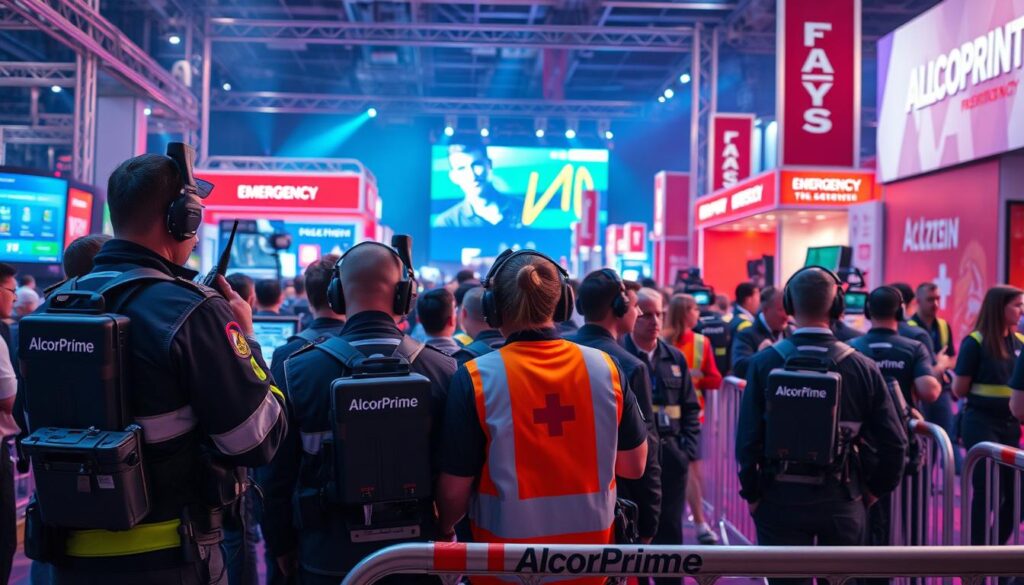Event organizers face crises at any time, threatening their events and reputation. Successful planners can handle these situations well, reducing harm and quick recovery. At Alcor Prime, we offer top-notch crisis management to keep your events safe and your brand intact. We stress the need for Crisis Management for Events and quick event crisis response.
Studies show that focusing on crisis management can cut reputational damage by up to 50%1. Crises can lead to financial losses, legal issues, and harm to reputation. If not prepared, organizations might face big penalties2.
Key Takeaways
- Effective crisis management is crucial for minimizing damage and ensuring a swift recovery during events.
- Crisis Management for Events involves anticipating and responding to potential crises, protecting brand reputation and ensuring attendee safety.
- Event crisis response plans should incorporate risk assessment, emergency response, and business continuity planning to mitigate risks.
- Investing in crisis management training can lead to a 35% increase in overall effectiveness during critical events1.
- A well-defined emergency management strategy is critical, with many companies unaware of its inherent value and the risks of neglecting this aspect of event planning2.
We will explore crisis management, its importance, and key plan elements. We'll also share strategies for quick event crisis response. Our goal is to give you insights and expertise to manage crises and make your events successful.
Understanding Crisis Management in Event Planning
As event professionals, we focus on delivering top-notch service and staying positive in our industry. It's key to have strong emergency management for events to keep attendees safe and protect our reputation3. A crisis can hurt an event's success and cost a lot of money3. In fact, up to 60% of event planners say handling crises well boosts their brand's image3.
Having solid event safety procedures is vital to avoid and handle crises. Doing a risk analysis before the event can cut down crisis chances by up to 40%3. Also, having a Crisis Communications Team can make stakeholders more confident by 50% during crises3. Plus, having a crisis plan can lower reputation damage by about 65% compared to those without4.
Some important things for event safety include:
- Running regular crisis drills to get the team ready5
- Using tools to watch events in real-time and stop big crises5
- Creating a clear communication plan to calm attendees by 50%5
By focusing on emergency management for events and event safety procedures, we can make sure our events are safe and successful, even with unexpected crises4. A survey showed that 78% of event pros think a crisis plan greatly lessens crisis impact4. As we deal with event planning's challenges, staying ready and proactive is crucial5.
| Statistic | Percentage |
|---|---|
| Event planners who report that mitigating crises effectively has a direct impact on the public perception of their brand | 60% |
| Organizations that reduce the risk of reputation damage by having a documented crisis management plan | 65% |
| Event planners who believe that having a crisis management plan significantly reduces the impact of a crisis | 78% |
Types of Crises in Events
Events face many crises, like natural disasters and security threats. It's key to have good event incident management and event risk mitigation plans. Our team offers top-notch crisis management, including risk assessment and mitigation. We help event organizers get ready for and handle crises6.
Some common crises for events include:
- Natural disasters, such as earthquakes, hurricanes, or floods
- Security threats, like terrorism or cyberattacks
- Technological failures, including power outages or equipment malfunctions
- Health emergencies, such as outbreaks or medical incidents
Having a solid crisis management plan is vital for event safety and success7.
Knowing the types of crises and having good event incident management and event risk mitigation plans helps. Event organizers can lessen disruption risks and ensure a great event. Regular training and preparedness for event teams also help, as shown in case studies6.
Key Elements of a Crisis Management Plan
We help you improve your event planning skills. This includes creating a strong crisis management plan. It should cover emergency preparedness and disaster recovery. A good plan is key for managing crises well. It must assess risks, plan for prevention, response, and recovery8.
A solid plan includes risk assessment, communication, resource allocation, and recovery steps9. It should also have a clear communication strategy and emergency response plans. Some important parts of a crisis plan are:
- Risk assessment to find potential weaknesses
- Communication strategy for quick and clear info
- Emergency response plans
With these elements, organizations can handle crises well. This protects their events and operations. Training and drills boost staff confidence and readiness9. We focus on emergency preparedness and disaster recovery in our crisis management approach. We help our clients create detailed plans that fit their needs.
Risk Assessment
Risk assessment is vital in a crisis plan. It spots potential threats and weaknesses. By assessing risks, organizations can plan to avoid or lessen crises8.
Communication Strategy
A good communication plan is crucial for crisis management. It ensures timely and accurate info to all. This helps avoid confusion and lessens crisis impact9.
Creating a Crisis Management Team
Creating a crisis management team is key to handling emergencies well. This team needs clear roles and must work together quickly. Studies show10 that 70% of companies with a crisis plan handle emergencies better than those without.
The team should have members from different areas like operations and finance. They must work on event security plans and train staff. Data11 shows that keeping people safe is a top priority in crisis management.
Some important tasks for this team include:
- Creating event security plans
- Training staff
- Working with emergency services
- Talking to people during emergencies
To learn more about setting up a crisis team, visit Alcor Prime10. We offer crisis management services, including event security.

Pre-Event Planning for Crisis Management
We know how vital pre-event planning is for crisis management. It's about spotting risks like the event location, weather, and who's coming12. Making a crisis timeline helps us see how crises might happen and how to react. Studies show that good planning can cut crisis damage by half12.
Having a solid communication plan is key. It covers talking to our team, the public, and other important groups. Surveys show that clear communication can lessen bad feelings by 75% in a crisis13. We focus on making sure everyone knows what's happening and how we're handling it.
Important things to think about before the event include:
- Spotting risks and making a crisis timeline
- Creating a communication plan
- Doing training and drills to get better at responding
By doing these things, event planners can be ready for any crisis. They make sure their response is quick and effective12.
Communication Strategies During a Crisis
We know how key good communication is in a crisis. This includes talking to both inside and outside groups. A solid plan for talking is key to handling a crisis well. It shows that groups with plans can act fast14. Our team works hard to help make and use good crisis communication plans.
Good inside talk makes sure everyone knows what to do. Outside talk helps keep the event's image strong and keeps people informed. It's important to keep the message the same everywhere. This stops confusion and makes sure everyone gets it14. We also stress the value of being kind and understanding in tough times. This helps build trust and shows you care about the problems people face14.
Using many ways to talk helps reach more people. Groups that use different methods (like press releases and social media) make their message easier to get14. The "15-20-60-90" rule says to say you're dealing with a crisis in 15 minutes, share more in 60, and be ready for the media in 9015. By sticking to this and keeping the message the same, groups can handle a crisis well and protect their image and work.
| Communication Strategy | Importance |
|---|---|
| Internal Communication | Ensures team coordination and response |
| External Communication | Manages event reputation and stakeholder information |
| Consistent Messaging | Avoids confusion and ensures clear understanding |

Training Staff for Crisis Situations
Training staff for crisis situations is key in event management. Our team helps you reach your event goals by offering training and support. In 2018, 2.8 million nonfatal workplace injuries and illnesses were reported16. This shows the need for good training programs.
Good crisis management means doing simulation exercises and keeping training up to date. This ensures staff knows the latest strategies and protocols. Key areas include:
- First aid and emergency response
- Emergency exits and evacuation procedures
- Pandemic planning and business continuity strategies
Investing in crisis management training can lower incident risk. Studies show a 65% increase in staff confidence in emergencies17. Regular updates help staff handle unexpected crises better.
Crisis management training is an ongoing process. It needs regular reinforcement and updates. By focusing on training, event organizers can make their events safer and more resilient. This protects attendees, staff, and reputation.
Real-Time Monitoring and Response
We offer expert crisis management solutions, including real-time monitoring and response. These are tailored to your needs to help you prepare for and respond to crises. Effective event emergency preparedness and event disaster recovery plans are key in today's fast event world. Technology and tools, like crisis management software, help organizations respond quickly18.
Real-time monitoring lets event organizers spot risks fast and act quickly. This includes tracking severe weather, watching social media for threats, and analyzing data for risk intelligence18. With a plan, organizations can reduce disruption and recover fast. For example, automated workflows speed up responses, and dashboards give senior management updates on efforts18.
Some important things for real-time monitoring and response are:
- Using technology and tools to improve monitoring and response
- Creating a detailed crisis management plan with emergency and disaster recovery strategies
- Training staff regularly to ensure they can handle crises well
By focusing on real-time monitoring and response, organizations can make events safe and successful, even with unexpected challenges19.

Lessons Learned from Past Events
Effective crisis management is key for event success. By looking at past events, we can see what worked and what didn't. This helps us improve our event security plans. For example, companies with crisis plans recover faster than those without20.
During the COVID-19 pandemic, over 80% of companies changed their communication20. The Australian wildfires showed drones with thermal imaging cut response times by 37%20. These stories teach us the importance of learning from past events.
Common errors include poor communication, bad planning, and not enough resources. By avoiding these and having good event security, we can reduce crisis risks. If you want to know more about our crisis management services, including event security, contact us.
- Establishing effective communication strategies
- Conducting regular risk assessments
- Developing comprehensive event security protocols
By following these tips and learning from past events, we can host successful and safe events. These events will meet the needs of our clients and attendees.
Post-Crisis Evaluation
After a crisis, it's key to do a deep evaluation. This helps event organizers learn and get better for the next time. Many groups miss out on learning from past crises, which is a big mistake21.
Good evaluations let everyone share their thoughts freely. This makes the whole team more accountable21.
A good evaluation looks at what went right and what didn't. Surveys or outside reviews can check how well messages were shared21. It's also important to see if the right help was used during the crisis21.
By really looking into what happened, event teams can find ways to do better. This helps them get better at handling crises in the future.
Some important things to think about in a post-crisis review are:
- How fast and effective the response was22
- If messages were the same everywhere22
- How to improve feedback and training22
By following these steps, event teams can make their crisis management better. This helps them handle events more smoothly in the future.

Updating Crisis Management Plans
We know how vital it is to keep crisis management plans up to date. This means always improving them, like reviewing and updating the plan often. We also need to adapt to new challenges, like changes in events or new crises23. Our goal is to help our clients stay ready with top-notch service.
Good emergency management for events and event safety procedures are key to lessening crisis effects. By adding these to crisis plans, companies can cut crisis costs by up to 30%23. They can also boost customer trust by 25%23. It's also important to train crisis teams and staff well to get better at handling crises24.
Some important steps for updating crisis plans include:
- Doing detailed risk assessments to focus on risks that matter most to the company24
- Creating clear communication plans to protect the company's image and show commitment to openness24
- Keeping the plan current and effective by regularly checking it against new threats and changes in the company25
By using these tips and the latest research, companies can make crisis plans that work well. This helps reduce crisis effects and keeps businesses running smoothly232425.
Conclusion: The Importance of Preparedness
Crisis management is key in event planning. It helps make events safer and less affected by unexpected problems26. The International Association of Exhibitions and Events (IAEE) found that 40% of planners lack a risk management plan27. This shows how crucial it is to be ready.
At Alcor Prime, we know how vital proactive crisis management is. Our team helps create detailed plans to handle risks and improve communication28. This way, your event can go smoothly, even with challenges28.
Working with us means your event is in good hands. We focus on keeping your guests safe and secure27. We also keep your plan updated with the latest practices27. This can lead to fewer and less severe incidents over time27.
Get in touch to discover how our crisis management services can help. Together, we can make your event memorable and safe for everyone.
FAQ
What is crisis management for events?
Crisis management for events means getting ready for and handling problems that might happen. It's about being ready for issues before, during, and after an event. This way, the event can run smoothly, and everyone stays safe.
Why is crisis management important for event planning?
Crisis management is key for event planning. It keeps people safe, protects the event's good name, and makes sure things go as planned. With a good plan, event organizers can handle problems well.
What are the common types of crises that can affect events?
Events face many crises, like natural disasters or security threats. Knowing these risks helps make a strong crisis plan.
What are the key elements of a crisis management plan?
A good crisis plan has a few main parts. First, you need to know what risks are possible. Then, you should have a plan for sharing information clearly and quickly. Lastly, you need steps for how to act in different crisis situations.
How should a crisis management team be structured?
Building a crisis team is important. The team should have clear roles and work well together. It should include people from different areas, like operations and communications.
What should be considered during the pre-event planning for crisis management?
Before the event, think about possible risks. Look at the location, weather, and who will be there. Making a timeline helps plan how to handle different crises.
How can effective communication strategies be implemented during a crisis?
Good communication is crucial in a crisis. Talk to your team to keep them informed and working together. Also, have a plan for sharing information with the public to protect your event's image.
Why is training staff for crisis situations important?
Training staff is vital for crisis management. Practice crisis scenarios to prepare them. Also, keep training up to date so they know the latest strategies.
What role does real-time monitoring and response play in crisis management?
Watching and responding in real-time is key. Use technology to keep an eye on things and adjust plans as needed.
How can event organizers learn from past events to improve crisis management strategies?
Learning from past events helps improve crisis plans. Study what worked and what didn't. This way, you can avoid mistakes and do better next time.
What is the importance of post-crisis evaluation?
Evaluating after a crisis is very important. Check how well your response worked and what could be improved. Use feedback to make your plans better for the future.
How can event organizers ensure their crisis management plans remain effective and relevant?
Keep your crisis plans up to date. Review and update them often. Also, be ready to adapt to new challenges and changes in the event world.





